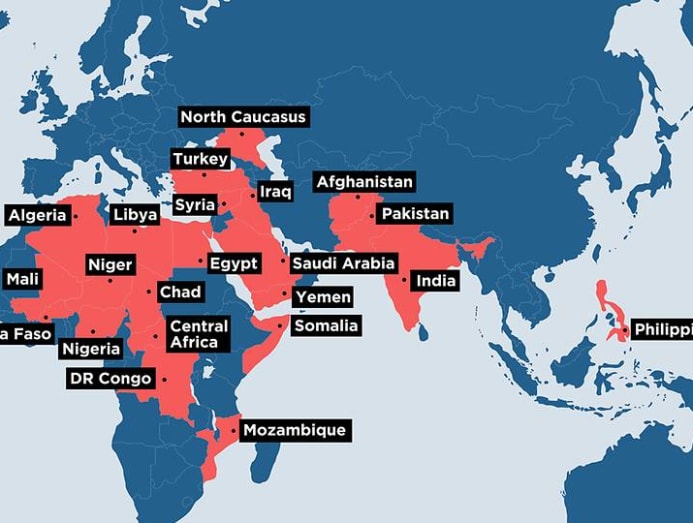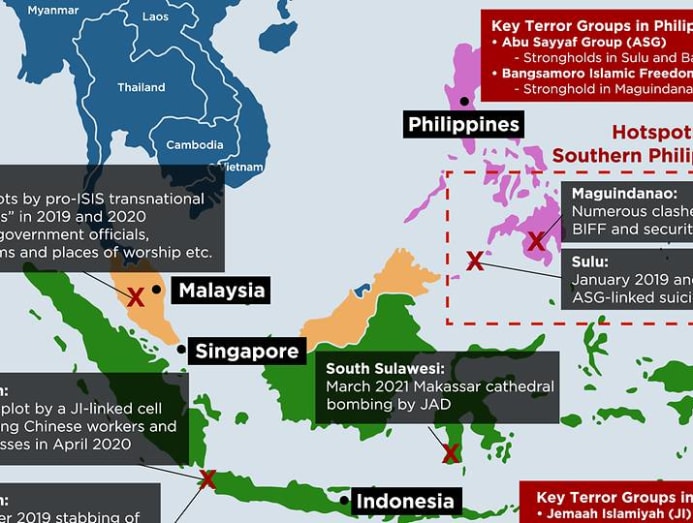Self-radicalisation main terror threat in Singapore; far-right extremism an emerging concern: ISD report
SINGAPORE: Cocky-radicalised actors influenced by extremist materials online are the primary domestic terrorism threat facing Singapore, the Internal Security Department (ISD) said in a written report released on Wednesday (Jun 23).
And while Islamist terrorism remains the principal business concern, far-correct extremism is an emerging threat, information technology said in the Singapore Terrorism Threat Assessment Report 2021.
ISD assessed that at that place is currently no specific nor apparent intelligence of an imminent terrorist assail against Singapore, but the terrorism threat to Singapore remains high.
"Globally, terrorist activities take persisted amid the ongoing COVID-nineteen pandemic, with terrorist recruitment and propaganda efforts stepped up online," said ISD.
READ: Commentary: Redpilling, rabbit holes and how far-right credo spreads in online spaces
TREND OF SELF-RADICALISATION
ISD said that 54 people have been dealt with under the Internal Security Act (ISA) for terrorism-related comport since 2015. Of these, 44 were cocky-radicalised.
Over the last two years, 14 out of 16 people issued with terrorism-related ISA orders were self-radicalised. They include 10 Singaporeans and four foreigners - three Indonesians and a Bangladeshi who were working in Singapore.
The majority of the fourteen cocky-radicalised individuals were supporters of Islamic Land.
"About of them remained staunchly supportive of ISIS (Islamic State in Iraq and Syria) even with the group'due south territorial losses and eventual military defeat," said the study.
2 individuals were inspired by other causes.
One of the 14 is a 16-year-old Singaporean who was inspired by far-right extremist credo - the commencement such case detected in Singapore. He had targeted ii mosques in planned copycat attacks of New Zealand's Christchurch attacks.
READ: 16-year-old Singaporean detained nether ISA later planning to assail Muslims at ii mosques
Overseas, far-right extremist groups have reportedly become more organised and capable of mounting attacks. However, ISD said that there is currently no indication that far-right extremism has gained significant traction in Singapore.
"However, this does non mean that we are allowed to far-right/anti-Islam ideologies, which are prevalent on social media," it said.
"Nosotros have to stay vigilant and have a firm stand against whatever rhetoric that promotes hatred or animosity towards other communities, and depict the line at the pursuit of any tearing action, regardless of how it is justified."
It noted that at that place is a likewise wider tendency in contempo years for solitary actors to employ "easily available means", such as knives and vehicles, in terrorist attacks. While Singapore has strict regulations on firearms, attackers can resort to weaponising readily accessible items.

READ: xx-yr-one-time detained under ISA after planning to attack Jews at a Waterloo Street synagogue
Some other example not linked to Islamic Country was a 20-year-former Singaporean - the first self-radicalised individual detained under the ISA who was primarily driven by the Israel-Palestine disharmonize.
A detention gild under the ISA was issued confronting him on Mar 5 this year.
He had wanted to travel to Gaza in the Palestinian territories to join Hamas' war machine wing in its fight confronting Israel. He had likewise made plans and preparations to attack Jews at a synagogue.
EXTERNAL THREATS
Within Southeast Asia, Islamic State remains the primary terrorism threat actor, said ISD. The region remains part of Islamic State'due south decentralised "global caliphate", with southern Philippines and Myanmar'due south Rakhine state equally potential theatres of extremism.

The number and scale of terror attacks and plots by regional pro-Islamic State terror groups fell in 2022 and 2022 due to strong counter-terrorism measures and COVID-xix travel restrictions besides appeared to have hampered the movement of terrorists in the region.
But despite losing its last territorial stronghold in March 2019, the terror group remains an active insurgent force in Syria and Iraq.
"It reportedly still has some x,000 fighters in the conflict zone and tens of millions of dollars in cash reserves," said the study.
"Over the by yr, ISIS has escalated its insurgent activities in the conflict zone, taking advantage of the security vacuum left by reduced military operations due to COVID-19 and the reduction in US troops in Iraq."
Since the demise of its so-called caliphate, Islamic Country has repositioned its propaganda narrative, calling it a "battle of compunction".
"In line with this narrative, it has stepped upwardly calls for its affiliates and supporters worldwide to conduct attacks wherever they are."

Jemaah Islamiyah, the terrorist group aligned with Al-Qaeda remains a latent terror threat, ISD said. There are recent signs that it is rebuilding its military capabilities and may re-appoint in terrorist violence in Indonesia.
ISD said that it remains on high alert although at that place is no specific or apparent intelligence of an imminent terrorist assault against Singapore.
"The contempo cases involving the two Singaporean youths who had fabricated detailed plans and preparations to kill Muslims and Jews in Singapore, are a sobering reminder that the threat of lone actor attacks remains very real," it said.
Equally Singapore is an open up society, Singaporeans are susceptible to being influenced by external developments and events abroad can have an touch on the domestic security landscape, it added.
Source: https://cnalifestyle.channelnewsasia.com/singapore/self-radicalisation-main-terror-threat-singapore-far-right-extremism-emerging-concern-isd-report-277351
0 Response to "Self-radicalisation main terror threat in Singapore; far-right extremism an emerging concern: ISD report"
Post a Comment